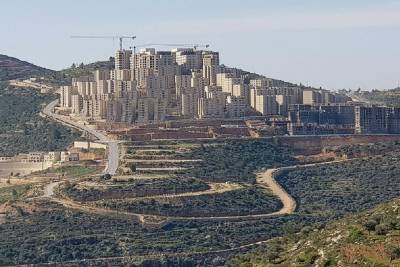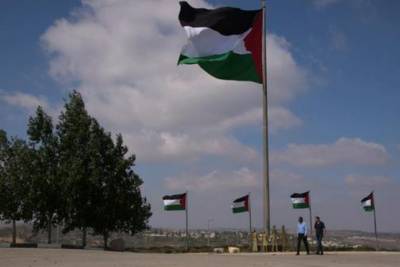The new Palestinian city
Israel Hayom - Elliott Abrams - Elliott Abrams is a senior fellow for Middle East Studies at the Council on Foreign Relations. This piece is reprinted with permission and can be found on Abrams' blog "Pressure Points."
The Associated Press reported this week on the arrival of the first families moving into Rawabi, a new city being built in the West Bank.
Rawabi is a marvel in many ways. I visited there in January, toured around, and spoke with the founder, Bashar Masri. Rawabi is about 5 miles from Ramallah and will eventually house 25,000 residents. Construction has been slowed by grudging cooperation from Israel, and even today Rawabi has not been permitted to construct an adequate access road and to connect to sufficient water supplies. But the project is an extraordinary achievement, well designed for living and shopping, with public spaces such as a beautiful open-air amphitheater.
The AP story states that Rawabi isn't just about real estate but is part of the statehood dream. Here I disagree. The "statehood dream" is in the hands of the PLO and the Palestinian Authority, which are both far too incompetent and corrupt to have built Rawabi. It is successful in large part because it is a private sector project that has as little as possible to do with Palestinian politics. Rawabi is in my view more about Palestinians' desires for a normal life, in a new city where they can live well despite the political problems that surround them.
Rawabi's own website says it well:
"Rawabi is a new community for Palestinian families that will provide opportunities for affordable home ownership, employment, education, leisure and an attractive environment in which to live, work and grow. ... The city center offers a retail business district with hotels, cinemas and a convention center, all supported by the latest smart technologies and a high-speed fiber-optic network. Rawabi also features education and medical facilities, houses of worship, public green spaces, and recreation facilities -- creating a new Palestinian economic and cultural destination.
"As the largest private sector undertaking in Palestinian history, Rawabi will expand the local economy's linkages to the global knowledge economy. It will introduce new technologies to the Palestinian construction sector and encourage international firms, particularly in the high-tech, health care and renewable energy sectors, to take up a key role in bolstering current economic activities. Through attracting investors and technology suppliers, Rawabi plans to generate more than 5,000 permanent jobs, creating quality of life and making a long-term, sustainable contribution to national prosperity.
"Bayti Real Estate Investment Company, the developer of Rawabi, is jointly owned by Qatari Diar and Massar International. It was established to jump-start the development of the Palestinian real estate sector with a mission to create affordable, accessible, family-friendly communities and create several thousand direct and indirect employment opportunities for Palestinians, providing multi-level stimulus to the national economy."
Notice: No politics here, and one wonders why AP felt it necessary to insert it.
Rawabi is a wonderful and impressive achievement, which Israelis should be applauding rather than intermittently slowing and obstructing. (Some of the obstructions come from residents of nearby Israeli settlements, whose objections are presumably ideological: They want more Israeli towns built near them, not more Palestinian towns.)
The message to Palestinians, I would think, is that life in the West Bank can be greatly improved by Palestinians. Rawabi is certainly a rejection of the theology of victimization that makes Palestinians into helpless objects of Israeli actions. Rawabi demonstrates that despite the failures of Palestinian politics, Palestinians can be actors in and agents of positive change.
From "Pressure Points" by Elliott Abrams. Reprinted with permission from the Council on Foreign Relations.
To view original article, Click Here.



